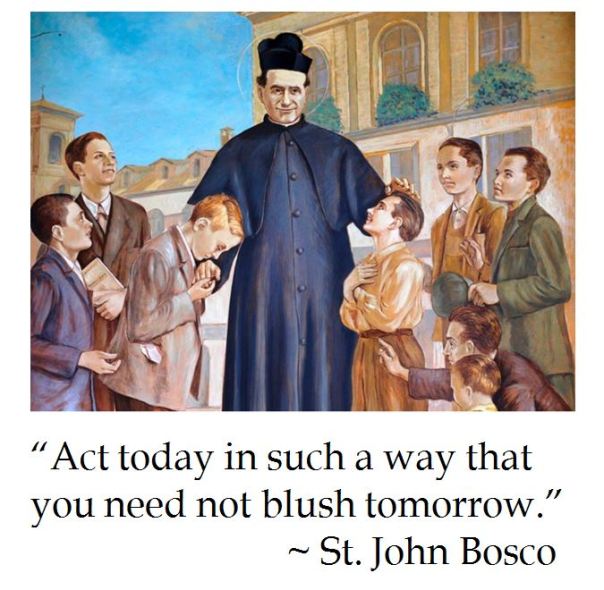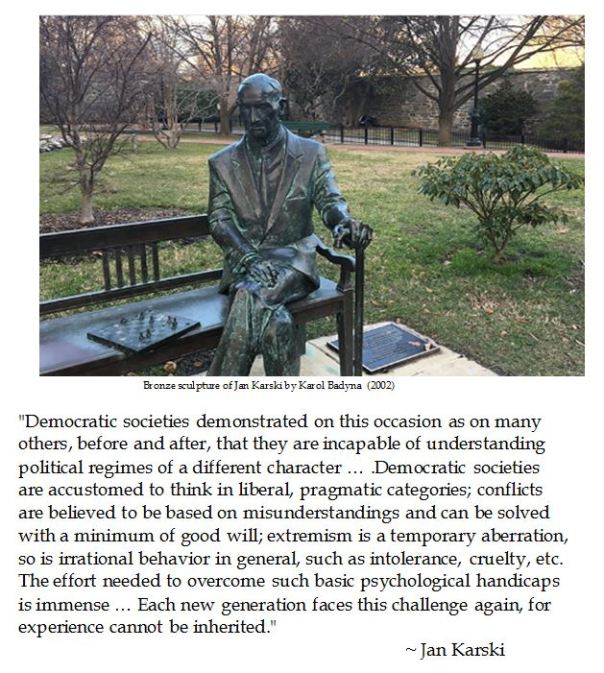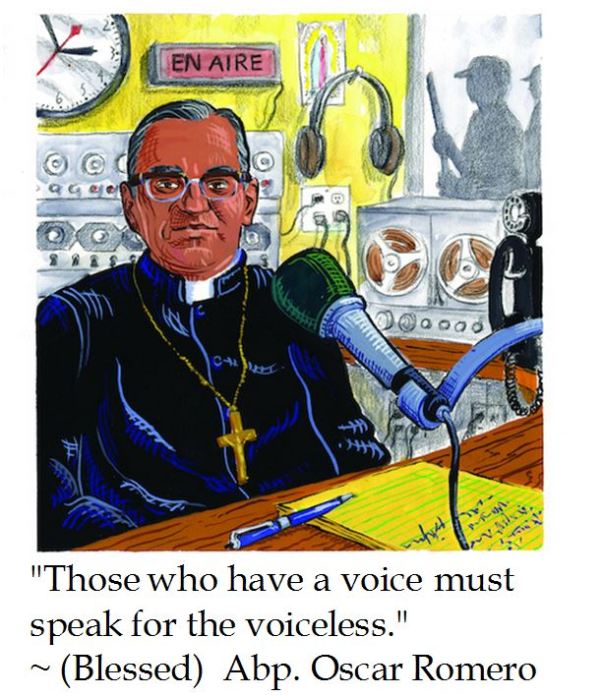Tuesday, January 31, 2017
Monday, January 30, 2017
Honoring Jan Karski, the Messenger from Hell
Today in a ceremony in Manhattan, academics posthumously honored longtime Georgetown University professor Jan Karski, a man who tried to prevent the Holocaust by sharing the truth. Alas, politicians among the Allies were tardy to act of the news from Karski as the Messenger from Hell.
During the Second World War,I Karski was a Second Lieutenant in the Krakow Valvary Brigade who was captured after the battle of Tomaszow (1939) by the Russians. But due to Karski's birthplace, the Russians handed him over to the Germans, thus he avoided being a victim of the Katyn massacre of 1940.
Karski escaped his German POW train in 1939 and escaped to Warsaw where he joined the Polish Resistance movement. Larslo organized courier missions to the Polish Government in exile headquartered in Paris andhe himself made several secret trips to France and Britain. Karski was eventually captured by the Gestapo and tortured in Slovakia but was later smuggled out and rejoined the Polish Resistance.
Karski escaped his German POW train in 1939 and escaped to Warsaw where he joined the Polish Resistance movement. Larslo organized courier missions to the Polish Government in exile headquartered in Paris andhe himself made several secret trips to France and Britain. Karski was eventually captured by the Gestapo and tortured in Slovakia but was later smuggled out and rejoined the Polish Resistance.
In 1942, Karski was selected by Polish Prime Minister in exile Władysław Sikorski to go on a secret mission to gather first hand information about the Nazi atrocities in occupied Poland. Karski was smuggled into the Warsaw Ghetto. Karski also sought to infiltrate the Belzec death camp as an Estonian guard. Although Karski only managed to see a transit station, the horror that he witnessed first hand was appalling.
Eventually Jan Karski settled at Georgetown University, eventually earning a Ph.D in 1952 and taught there for over forty years. Georgetown remembers Jan Karski as many things — a beloved professor, writer,
and colleague, to name a few — but to the world, he was known as one of the
first to warn Western powers of the horrors of the Holocaust.
| Jan Karski at Yad Vashem (circa 1982) |
Although Karski was a Roman Catholic, he felt a profound connection with the people whose lives he attempted to save from the Holocaust. In 1981, Karski said: “All murdered Jews
became my family. I am a Christian Jew.” In 1982 Karski was
recognized by Yad Vashem as Righteous Among the Nations.
| "Whoever does not condemn, consents" mural in Warsaw |
Karski's faithful witness has been remembered from murals in Warsaw to a series of five bronzes of Karski sitting on a bench playing chess created by Krakow sculptor Karol Badyna which are located in Georgetown, Manhattan, Lodz, Warsaw, Keilce and Tel Aviv University in Israel.
Labels:
Anthony Eden,
Art,
Catholic,
Cordell Hull,
DMV,
Felix Frankfurter,
Franklin Roosevelt,
Georgetown,
History,
Holocaust,
Jan Karski,
Jewish,
Karol Badyna,
Poland,
Videos,
Warsaw Ghetto,
World War II
Sunday, January 29, 2017
Saturday, January 28, 2017
Friday, January 27, 2017
Tuesday, January 24, 2017
Sunday, January 22, 2017
Tuesday, January 17, 2017
Monday, January 16, 2017
Monday, January 9, 2017
Henry Wadsworth Longfellow on the Three Kings
Three Kings came riding from far away,
Melchior and Gaspar and Baltasar;
Three Wise Men out of the East were they,
And they travelled by night and they slept by day,
For their guide was a beautiful, wonderful star.
The star was so beautiful, large and clear,
That all the other stars of the sky
Became a white mist in the atmosphere,
And by this they knew that the coming was near
Of the Prince foretold in the prophecy.
Three
caskets they bore on their saddle-bows,
Three
caskets of gold with golden keys;
Their
robes were of crimson silk with rows
Of
bells and pomegranates and furbelows,
Their
turbans like blossoming almond-trees.
And
so the Three Kings rode into the West,
Through
the dusk of the night, over hill and dell,
And
sometimes they nodded with beard on breast,
And
sometimes talked, as they paused to rest,
With
the people they met at some wayside well.
"Of
the child that is born," said Baltasar,
"Good
people, I pray you, tell us the news;
For
we in the East have seen his star,
And
have ridden fast, and have ridden far,
To
find and worship the King of the Jews."
And
the people answered, "You ask in vain;
We
know of no King but Herod the Great!"
They
thought the Wise Men were men insane,
As
they spurred their horses across the plain,
Like
riders in haste, who cannot wait.
And
when they came to Jerusalem,
Herod
the Great, who had heard this thing,
Sent
for the Wise Men and questioned them;
And
said, "Go down unto Bethlehem,
And
bring me tidings of this new king."
So
they rode away; and the star stood still,
The
only one in the grey of morn;
Yes,
it stopped --it stood still of its own free will,
Right
over Bethlehem on the hill,
The
city of David, where Christ was born.
And
the Three Kings rode through the gate and the guard,
Through
the silent street, till their horses turned
And
neighed as they entered the great inn-yard;
But
the windows were closed, and the doors were barred,
And
only a light in the stable burned.
And
cradled there in the scented hay,
In
the air made sweet by the breath of kine,
The
little child in the manger lay,
The
child, that would be king one day
Of
a kingdom not human, but divine.
His
mother Mary of Nazareth
Sat
watching beside his place of rest,
Watching
the even flow of his breath,
For
the joy of life and the terror of death
Were
mingled together in her breast.
They
laid their offerings at his feet:
The
gold was their tribute to a King,
The
frankincense, with its odor sweet,
Was
for the Priest, the Paraclete,
The
myrrh for the body's burying.
And
the mother wondered and bowed her head,
And
sat as still as a statue of stone,
Her
heart was troubled yet comforted,
Remembering
what the Angel had said
Of
an endless reign and of David's throne.
Then
the Kings rode out of the city gate,
With
a clatter of hoofs in proud array;
But
they went not back to Herod the Great,
For
they knew his malice and feared his hate,
And
returned to their homes by another way.
~ Henry Wadsworth Longfellow
~ Henry Wadsworth Longfellow
Saturday, January 7, 2017
Monday, January 2, 2017
Sunday, January 1, 2017
Subscribe to:
Posts (Atom)














